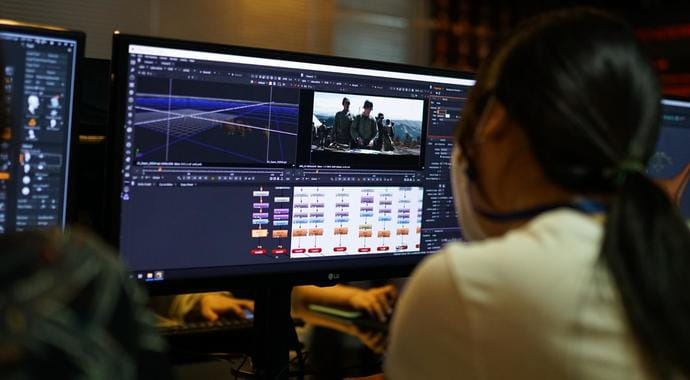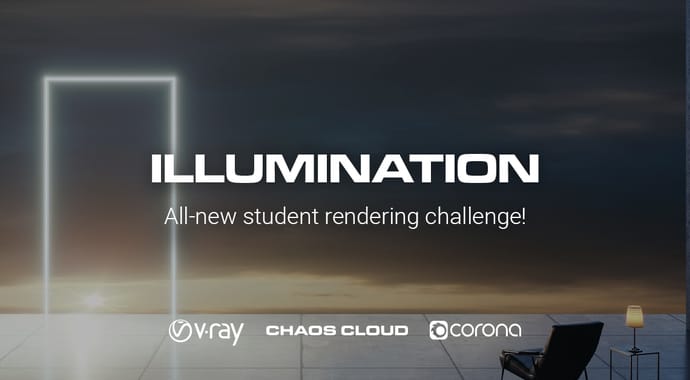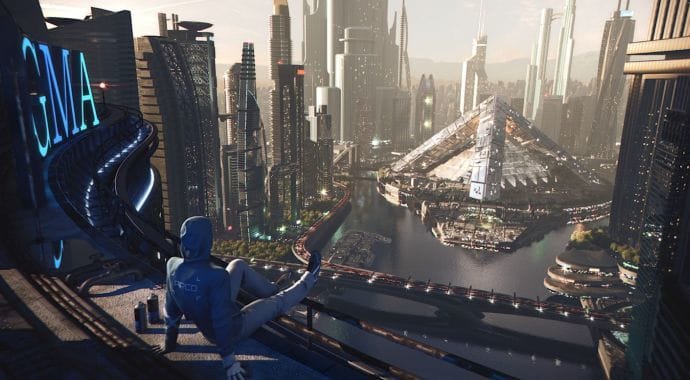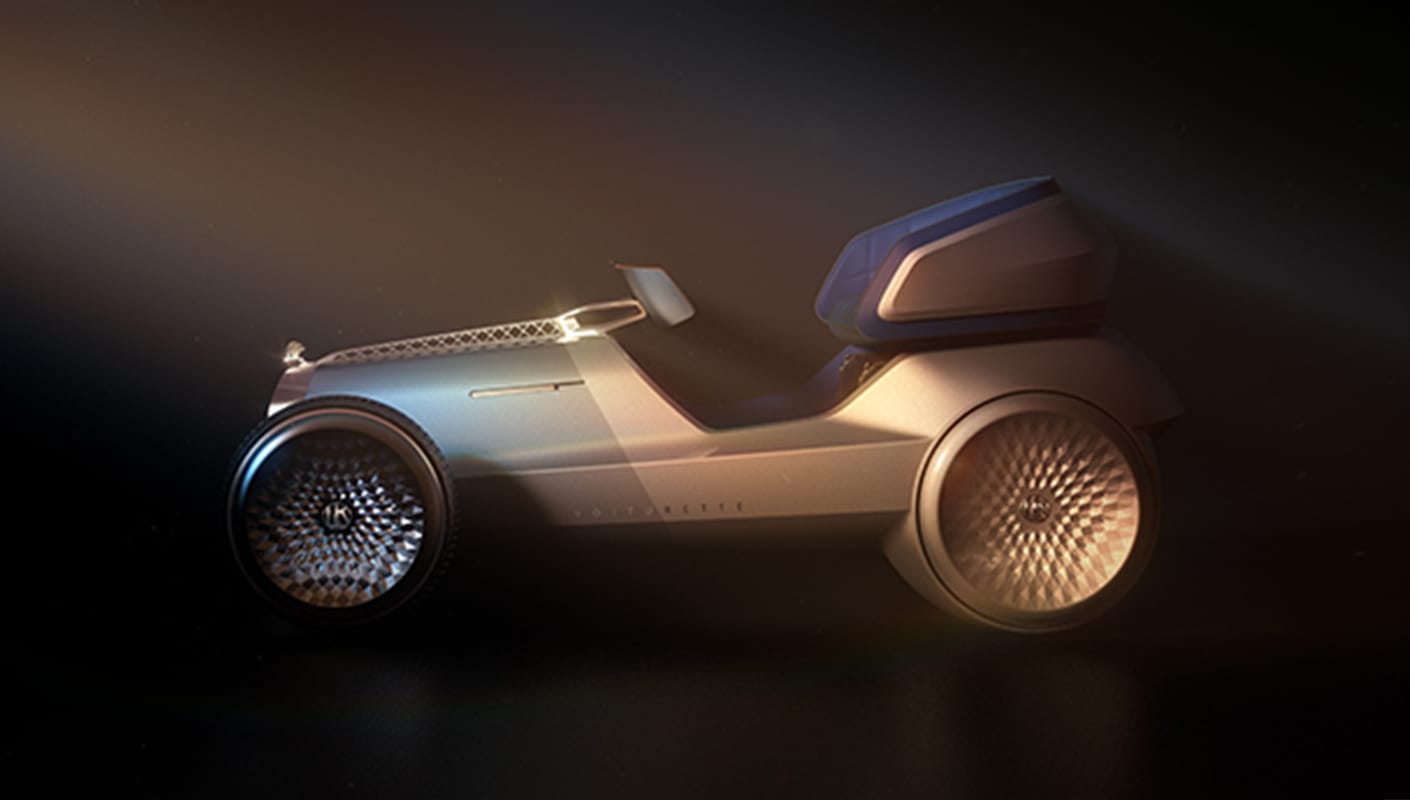Isaac Zuren tells us how winning our 2018 student rendering challenge helped him land dream jobs at MPC and ILM, and offers his tips from the professional world.
Chaos can help you win prizes — and a lot more. Over the past two years, our student rendering competition has attracted hundreds of entries from around the world, with winners receiving multiple prizes worth thousands of dollars and invaluable expert advice. It’s also a unique opportunity for entrants to get their work seen by industry leaders.
One of the student rendering competition’s biggest success stories is Isaac Zuren. Back in our 2018 “What’s Next?” challenge, his V-Ray for Maya-rendered vision of a futuristic Mexico City won our public vote, with over 1,000 thumbs-up. After winning, Isaac started working at the Moving Picture Company on movies including Sonic the Hedgehog and Call of the Wild, before moving to Industrial Light & Magic.
We caught up with Isaac to find out what it’s like to work for pioneering effects studios, and he shares some tips and tricks he’s learned along the way.

About Isaac Zuren
Born in Mexico City and currently living in Vancouver, Isaac Zuren is a 3D artist, designer and photographer.
His work ranges from architectural visualizations to industrial design and advanced photorealistic compositions, and he's spent more than 10 years studying and practising digital arts.
How have things changed since you took on our challenge to show us “What’s Next?”
IZ: Since late 2019, things have been extraordinary both personally and professionally. I started in the industry as a lighting artist at Moving Picture Company. Six months later, ILM Vancouver reached out to me and I immediately jumped into the new position as a generalist. I’ve learned an enormous amount from both roles.
My winning piece was seen by multiple VFX supervisors, including one from ILM who invited me to have a chat about the possibility of joining them.
Isaac Zuren, Generalist, ILM
Do you feel that winning the 2019 Student Rendering Competition helped you get where you are now?
IZ: For sure, it was very important. My winning piece was seen by multiple VFX supervisors, including one from ILM who invited me to have a chat about the possibility of joining them. This contest opened a lot of doors for me and highlighted my work in ways I could never have done alone.
What do you think is the most important thing graduates can do to kick-start their careers?
IZ: A general issue I see all the time is that graduates stop working on personal projects as soon as they get their diplomas. You should never stop doing what you enjoy and love, no matter how busy you are. Finding time to do your own personal work is important. All that hard work you put into all those small projects will reflect in your dedication and talent, and the quality of your work will be higher. Studios value this way more than someone who hasn’t done anything after graduation.


How did you find the transition from student to professional?
IZ: It is challenging in some ways, especially in aspects like studios’ pipelines, role hierarchies and communication. But once you adapt to those areas the transition is really smooth. Most of the soft skills learned in school are easy to take to any studio or work environment.
When I moved to ILM, luckily the main tools are 3ds Max, V-Ray, Clarisse and Maya. The generalist role was a dream come true because I was already familiar with the tools, which made learning the pipeline really straightforward.
Isaac Zuren, Generalist, ILM
Which software and tools do you use on the job? Did you have to learn any new ones?
IZ: In my case, I had to learn Katana and Renderman when I was a lighting artist at MPC. When I moved to ILM, luckily the main tools are 3ds Max, V-Ray, Clarisse and Maya. The generalist role was a dream come true because I was already familiar with the tools, which made learning the pipeline really straightforward.

Were there any specific soft skills that you found helpful during this time?
IZ: When your work is reviewed and criticized every day by your supervisors, you learn to become more self-aware of the art you are producing. With time, you make fewer mistakes, become more autonomous and develop a more artistic eye that understands how to represent realism in a 3D program.
Looking back at your formal education, is there anything that you would change if you knew what you know now?
IZ: Most of the time when you are a student you want to learn absolutely everything and master all the areas of CG — but what you end up with is a messy reel with no clear focus, instead of being great in one area. That happened to me a lot in my early demo reels.
I remember after finishing high school, I sent my demo reel to Blur Studio, kindly enough they forwarded it to a CG supervisor who gave me a lot of feedback on what and what not to do and then showed me some good examples of artists who have landed a job there. Honestly, their advice gave me direction and a clearer path, and I’m thankful for that.

What are the most important lessons you learned on the job?
IZ: Never be afraid to ask for help. As a junior, most of the time you hesitate to ask for help because you might think it’s a weakness or that the studio will kick you out because of your lack of knowledge. But it couldn’t be further from the truth — in fact, you are expected to ask, no one will ever judge you on how many questions you ask and 99% of artists will happily help you.
Making mistakes is important. When I entered ILM I wanted everything to be perfect for the lead and supervisor and that stressed me out a lot more. The first four weeks, I stayed late to learn about the pipeline and workflows, only to end up overloaded with information. Sometimes it is good to make mistakes and, in fact, I learned more about the technical aspects of the studio through getting things wrong. As a junior artist, studios expect that you will make a lot of mistakes during your learning process, but they will never punish or critique you for doing that.
It’s never personal. When you enter the industry you need to switch your mindset and understand that all feedback or critique is never towards you. The company you work for has a quality standard and if the work you are presenting doesn’t reach that you will get comments. That doesn’t mean that all of your work is bad, but that you need to keep refining and tweaking things until they reach the desired quality. Even the most experienced and talented artists get feedback; it’s rare to get your work approved the first time.

You previously told us that your plans are to become part of the VFX industry. Having landed on your dream job, what’s the next big milestone for you?
IZ: This last year I have accomplished most of my goals I set up before 2019 — sometimes it’s hard to believe that I already have three movies and a TV series in my portfolio. Now it’s time to think about the future again. My mid-term goal would be to become a senior artist and work on a Star Wars production. In the long term, I would love to become a VFX supervisor both on set and in the studio, and be in charge of important films. We’ll see how that goes — but I like to be optimistic!
Best of luck, Isaac!








